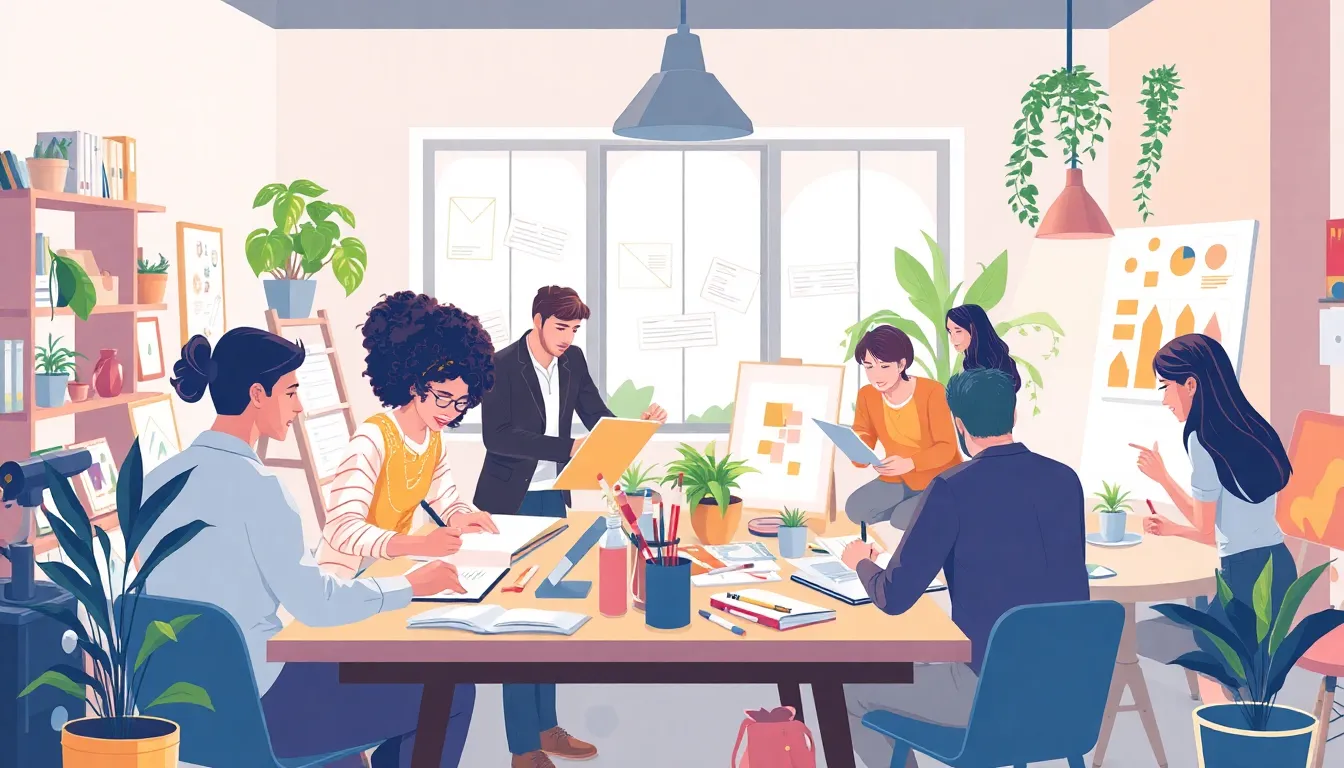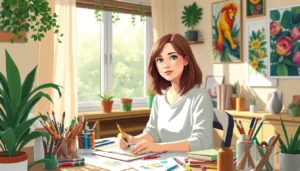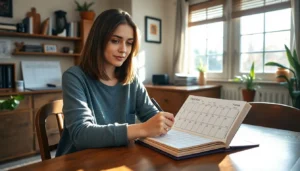Table of Contents
ToggleCreativity isn’t just for artists and writers; it’s a vital skill that everyone can cultivate. Imagine waking up every day with a spark of inspiration, ready to tackle challenges with innovative solutions. The secret? Developing a creative habit that transforms mundane routines into exciting adventures.
Understanding The Creative Habit
Creativity is integral to problem-solving and innovation. Building a creative habit enhances daily experiences and fosters a proactive mindset.
Definition and Importance
A creative habit encompasses consistent actions or routines that stimulate original thinking. This practice isn’t limited to artists; it’s vital for anyone aiming to think outside the box. It encourages exploration and experimentation, leading to breakthroughs in both personal and professional realms. Recognizing its significance helps individuals tap into their potential, unlocking new avenues for growth and expression.
Benefits of Cultivating Creative Habits
Cultivating creative habits brings numerous advantages. Enhanced problem-solving skills emerge as individuals learn to approach challenges from different angles. Improved mental health often follows, as engaging in creative activities can reduce stress and foster a sense of accomplishment. Additionally, building connections with others becomes easier, as shared creative pursuits promote collaboration and community. Overall, a consistent creative practice promotes a more fulfilling, dynamic life.
Key Elements of The Creative Habit

Cultivating a creative habit involves several key elements that contribute to a productive and innovative mindset. Focus on these aspects for a more enriching creative experience.
Consistency and Routine
Establishing a consistent routine remains foundational for fostering creativity. Engaging in creative activities regularly, such as writing, drawing, or brainstorming, enhances original thinking. Creating a dedicated time slot each day or week allows individuals to immerse themselves in their creativity. Repeating these actions reinforces neural pathways, making creativity feel more accessible. This approach decreases reliance on inspiration alone, enabling individuals to generate ideas more reliably.
Setting Goals and Intentions
Defining clear goals and intentions serves as a powerful motivator in the creative process. Individuals should identify specific outcomes they wish to achieve, whether completing a project, exploring a new medium, or developing a skill. Furthermore, setting realistic and measurable goals sustains focus and purpose. Intentions guide daily actions, ensuring efforts align with broader creative aspirations. Prioritizing tasks based on these intentions allows individuals to manage time effectively, leading to consistent creative progress.
Techniques to Develop The Creative Habit
Developing a creative habit involves practical techniques that stimulate original thinking. Engaging in specific practices consistently enhances creativity and offers various pathways to innovation.
Journaling and Reflection
Journaling serves as a powerful tool for creative individuals. Writing thoughts and ideas regularly encourages self-expression and clarity. Reflection on past experiences aids in recognizing patterns and shifts in perspective. Recording dreams, for instance, can inspire unique ideas. Reviewing journal entries periodically sparks new insights, reinforcing a creative mindset. Setting aside time for this activity enhances the ability to connect disjointed ideas. Regular engagement in journaling cultivates discipline and focuses attention on creative pursuits.
Engagement in Diverse Activities
Engaging in diverse activities broadens creative horizons significantly. Trying new hobbies fosters fresh inspiration. Exposure to different art forms, like painting or music, enhances one’s creative toolkit. Collaborating with others opens up opportunities for innovative discussion and feedback. Participating in workshops boosts skills and introduces new techniques that challenge thinking. Volunteering or visiting unfamiliar places often provides new experiences that trigger creativity. Balancing these activities within a routine supports consistent creative growth. Each new endeavor brings unique insights, expanding overall creative potential.
Overcoming Barriers to The Creative Habit
Creative individuals often face barriers that hinder their ability to cultivate a creative habit. Understanding and addressing these obstacles significantly enhances creative potential.
Fear of Failure
Fear of failure limits many people’s creative pursuits. It creates a blockage that prevents them from taking risks and exploring new ideas. This fear often stems from perfectionism or the pressure to meet external expectations. Embracing failure as a natural part of the creative process can foster resilience. When individuals view mistakes as learning opportunities, they can unlock new avenues of creativity. Celebrating small successes also builds confidence and encourages further exploration. Practicing self-compassion creates a supportive inner dialogue, making creativity feel more achievable.
Lack of Time
A common barrier to creativity is a lack of time. Everyday responsibilities often dominate schedules, leaving little room for creative activities. Prioritizing time for creativity is essential. Setting aside specific time blocks dedicated solely to creative pursuits can help individuals reclaim that lost time. Incorporating creativity into daily routines makes it more manageable. Even short bursts of creative engagement, such as 15 minutes of journaling or sketching, can lead to significant progress over time. Organizing other tasks allows more space for creative efforts, enhancing overall productivity and satisfaction.
Cultivating a creative habit transforms everyday life into a canvas for innovation and inspiration. By establishing routines and setting clear intentions, individuals can unlock their creative potential and tackle challenges with a fresh perspective. Embracing techniques like journaling and engaging in diverse activities fosters original thinking and enhances problem-solving skills.
Overcoming barriers such as fear of failure and time constraints is crucial for maintaining momentum. Celebrating small victories and prioritizing creative time can lead to significant personal growth. Ultimately, nurturing creativity enriches not only individual lives but also strengthens connections with others, paving the way for a more fulfilling and dynamic existence.






